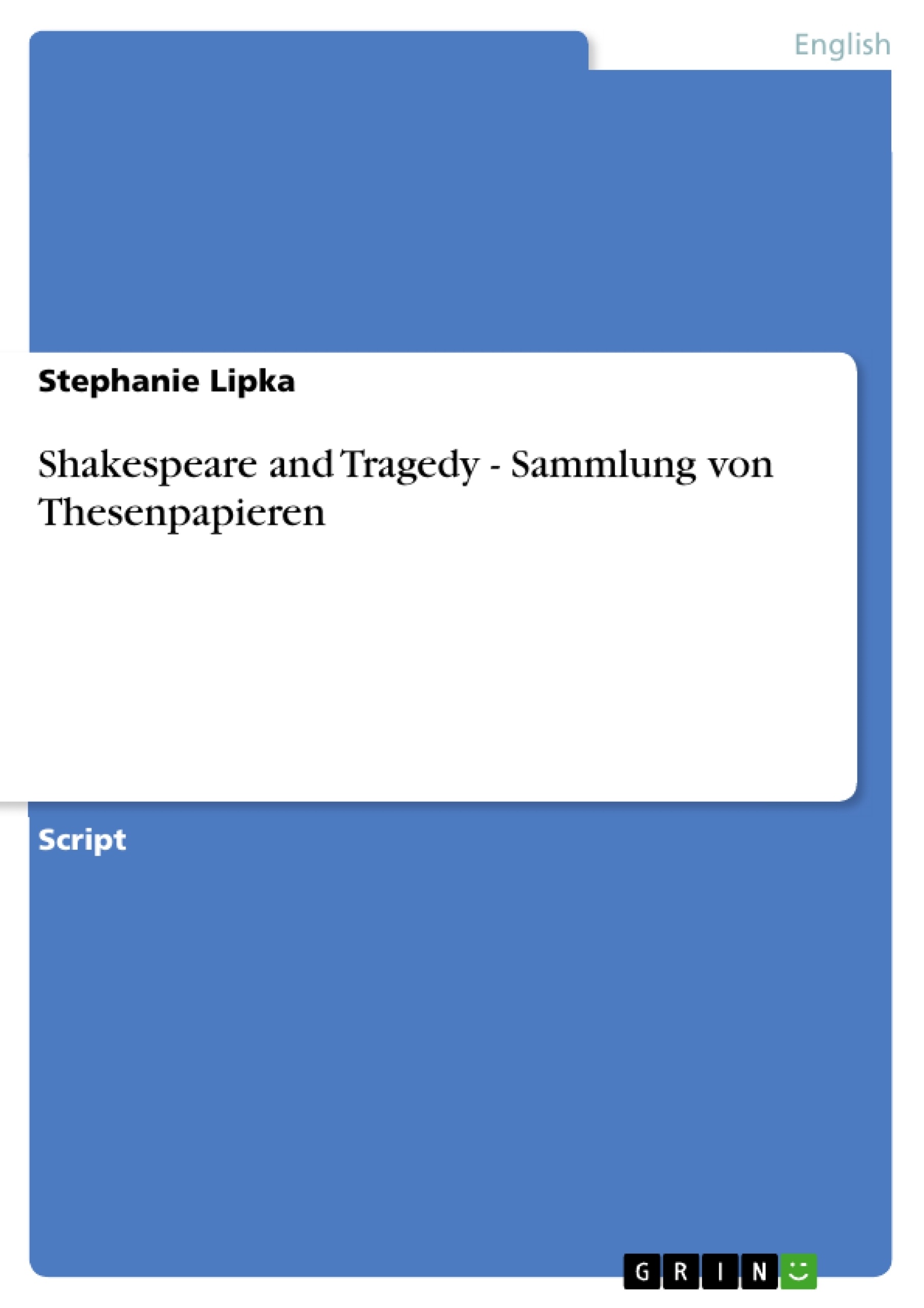Bei dieser Sammlung handelt es sich um Thesenpapiere des Hauptseminars "Shakespeare and Tragedy", welche der Vorbereitung der Seminarsitzungen dienten.
Die thematischen Schwerpunkte der Ausarbeitungen liegen auf Religion und Fremdartigkeit, Feminismus, Unterhaltung sowie Gesellschaftskritik. Schwerpunktmäßig werden die Stücke ‚Othello’, ‚King Lear’, ‚Antony and Cleopatra’ und ‚Romeo and Juliet’ betrachtet und im Hinblick auf Umsetzung und Rezeptionsästhetik diskutiert.
Inhaltsverzeichnis (Table of Contents)
- Antony and Cleopatra
- Different Kinds of Hero
- How To Be a Hero/Heroine
- Different Kinds of Hero
- From History to Tragedy
- Roman History
- Turning History into a Play
Zielsetzung und Themenschwerpunkte (Objectives and Key Themes)
This collection of seminar papers explores various aspects of Shakespearean tragedy through the lens of specific plays. The main objective is to examine the tragic elements present in these works, analyzing the characters, their relationships, and the historical context within which they are presented. The papers delve into the nature of heroism, the transformation of history into tragedy, and the role of love and violence in shaping the characters' destinies.
- The nature of heroism in Shakespearean tragedy
- The transformation of historical events into dramatic narratives
- The portrayal of love and relationships in tragic contexts
- The significance of violence and its role in shaping character development
- The influence of historical context on the portrayal of characters and their actions
Zusammenfassung der Kapitel (Chapter Summaries)
The first paper focuses on the play Antony and Cleopatra, analyzing the characters and their relationship in the context of a tragic love story. The author examines Antony's character as a passionate and honorable warrior, contrasting him with the more cunning and strategic Octavius Caesar. The paper also discusses Cleopatra's complex character and explores the elements of love, passion, and ambition that drive the plot.
The second paper continues the exploration of heroism within Antony and Cleopatra, identifying three distinct types of heroes: the traditional hero (Antony), the noble figure who ultimately brings order (Octavius Caesar), and the underdog heroes (Eros and Proculeius). The author examines each character's actions and motivations, highlighting the diverse ways in which heroic qualities are displayed.
The third paper shifts its focus to Titus Andronicus, exploring the play's connection to Roman history and the transformation of historical events into a tragic narrative. The author examines the playwright's use of historical sources, the role of human nature in shaping events, and the impact of tragic elements on the audience. The paper also discusses the concept of katharsis and its relevance to the play's themes of violence and retribution.
Schlüsselwörter (Keywords)
The seminar papers explore themes of tragedy, heroism, love, violence, history, and character development in Shakespearean plays. The works analyzed include Antony and Cleopatra and Titus Andronicus, highlighting the interplay between historical context, human nature, and dramatic narrative. Key concepts include katharsis, hybris, and the portrayal of different types of heroes.
Frequently Asked Questions
What are the main themes of the "Shakespeare and Tragedy" collection?
The focus is on religion, otherness, feminism, entertainment, and social criticism within Shakespearean tragedies.
How is heroism portrayed in "Antony and Cleopatra"?
The study identifies different kinds of heroes: the traditional hero (Antony), the noble figure of order (Octavius Caesar), and the underdog heroes (Eros/Proculeius).
What is the significance of violence in "Titus Andronicus"?
The papers discuss how violence and retribution shape character development and relate to the concept of 'katharsis' for the audience.
How does Shakespeare transform history into tragedy?
The collection explores how historical sources (like Roman history) are adapted into dramatic narratives that focus on human nature and tragic fate.
Which plays are primarily discussed in these papers?
The primary plays analyzed are Othello, King Lear, Antony and Cleopatra, Romeo and Juliet, and Titus Andronicus.
- Arbeit zitieren
- Stephanie Lipka (Autor:in), 2002, Shakespeare and Tragedy - Sammlung von Thesenpapieren, München, GRIN Verlag, https://www.grin.com/document/127447



